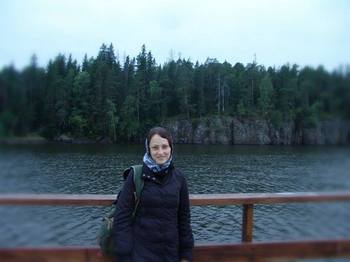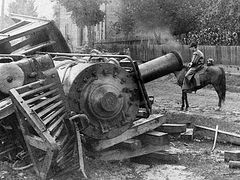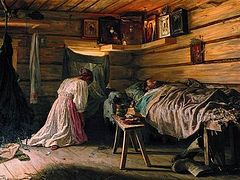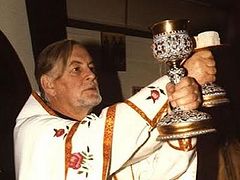To tell the truth, I have never met absolutely happy people. I saw people who were content, successful, talented, intelligent, kind, and not indifferent to others, yet there was something in the lives of all of them that grieved and even oppressed them… Perhaps our sorrows often stem from our inability to be content with very little and to thank… To thank not other human beings but God. We frequently offer up requests to God and seldom give thanks to Him, still less when life deals a blow to us…

Many years ago I had classmates named Anna and Alexander. A common story: A boy and a girl knew each other from childhood, fell in love with each other and became a nice couple. And their romance didn’t fade away after the “last bell” [a traditional ceremony of schools in Russia and a number of other post-Soviet countries; it is usually rung by a first-grader for school-leavers just after all the studies are finished but before the farewell party and final examinations.—Trans.], as is often the case. They got married when they were in their final years at university.
The couple was perfectly matched and was beautiful for the ability that befits a husband and a wife—to live for one’s other half not for oneself. They had great success in life, good jobs and rosy prospects. As you look at couples like this, it seems you know and see their lives beforehand—right until their old age, surrounded by the care of their grandchildren or great-grandchildren.
But the Lord often corrects our course of life quite contrary to our expectations for the future. A few years later Alexander, Anna’s husband, was killed in a horrible fatal car accident. This young man had been loved by all of his classmates and for some reason we had given him the honor and responsibility of organizing a class reunion one day. And now he was dead. And Anna never was as before.
A new, different life began for her, a life which she first had to “drag herself into”, as it were. She had to live with the awareness that her former life was gone never to return and that she wouldn’t see her beloved husband in this world anymore. And I, then a young priest, couldn’t find the strength for a deep conversation with Anna. I didn’t do it until some time later. I only remember that as soon as I started reading the Psalter over the coffin of Anna’s dead husband, the general stress was relieved, and after an hour or an hour and a half everybody sitting by the deceased were relieved as though the pain had temporarily abated. That event stuck in my memory.
From that moment on time passed so quickly. Anna and I would have frequent long talks and I would give her books on the Christian life. On Alexander’s birthdays and death anniversary days, Anna would ask me to perform memorial services for his repose. She began to take Communion, go to church, and take part in pilgrimage trips. She visited Greece many times, visited the Byzantine holy places on the territory of Turkey, lived in the Czech Republic for some time and tried to attend church there too. After returning home the woman lived and worked (as she did before), consciously bearing the cross of widowhood with humility. It was then that I came to understand that Anna really took her loss as a trial sent by the Almighty.
It is remarkable that thanks to this woman, many of our mutual friends and acquaintances became interested in the faith and began to go to church. Anna was everywhere her help was needed.
I recall that one day we joined a group of pilgrims who arranged a tour to Valaam Monastery. And there, during the church service I realized that nothing had changed in Anna’s life since her husband’s tragic death, that marriage hadn’t really become a thing of the past for her. The widow’s sense of bereavement had transformed into hope for their meeting in eternity. And we never spoke with her about the future thenceforth.
During Great Lent, Anna would take her friends to church to receive the Holy Unction. She sincerely rejoiced at Pascha, and when her late husband’s birthday (April 20) fell on Holy or Bright Week, she would postpone visiting his grave and other memorial events until the proper time1
I knew that she had changed significantly since Alexander’s death. Over the first months after the tragedy she would travel to the church attached to the cemetery on an almost daily basis and spend hours by her loved one’s grave. I believe that it was then that her meeting with Christ took place and it filled the void in her life. And Anna’s prayers for her late husband became a personal podvig [meaning “a spiritual labor”, or “feat” in Russian] for her.
Do you remember the words of Apostle Paul? I say therefore to the unmarried and widows, it is good for them if they abide even as I (1 Cor. 7:8); and, at the same time: I will therefore that the younger women marry, bear children, guide the house, give none occasion to the adversary to speak reproachfully (1 Tim. 5:14). Anna chose the first path. Any talk of a second marriage disturbed her peace of mind and even oppressed her. We hardly ever touched upon this subject during our personal conversations. I think it was no coincidence. All the more so because her private life (if we can use this term here) after Alexander’s death indeed never “gave occasion” to anybody to “speak reproachfully”.
Last June Anna visited Diveyevo Convent. She frequented this town and its holy convent founded by St. Seraphim of Sarov and loved it dearly. I must admit I fancied that at that time Anna had an impulse towards monastic life and that we would talk about this with her sooner or later. At the end of June I spoke on the phone with her and on July 4 Anna… passed away. She died in a car crash, like Alexander. All but Anna survived that terrible crash…

And it seemed to me that Anna’s untimely death was not only the work of Divine providence, which works in unfathomable ways, but also an indication for all of us… The widow’s prayers for the repose of her dead husband were accepted and answered, and the test that the Lord had put her through was duly withstood. On the day Anna was laid out before her funeral, the people visiting her apartment were amazed by the fact that Alexander’s personal things were lying folded so carefully and neatly, as if he had gone out for a short while and was just about to come back home.
When I was reading the Psalter over the coffin of the newly-departed Anna, the general stress was relieved, and after an hour or an hour and a half everybody sitting by the deceased were relieved as though the pain had temporarily abated… We had experienced the same a few years earlier with Alexander.
Anna was buried next to her spouse. Now they are together—not only in the cemetery but also (I do believe so!) in heaven. Anna’s life from her husband’s death right until her own was filled not only with meaning, but also with hope that was strengthened by faith and reinforced by love.
December 2014 saw the fifth anniversary of Alexander’s death. And Anna would have turned thirty-three. Eternal memory and a blessed repose to this wonderful couple!
It usually seems to us that our lives are built according to customary patterns and that we can predict all major events of our lives till our old age… In reality, we cannot plan out our lives ahead. God guides us along specific paths where we meet and part with various people, some of whom become our intimate friends, while some remain almost strangers. These meetings and, especially, partings are extremely important to us as the Lord reveals the main purpose and the only meaning to us, namely that all things are united and everlasting in Him and with Him. So we must walk forward, not only imploring the Lord to help us, but also giving thanks to Him.
The photos are from the author’s archive.




